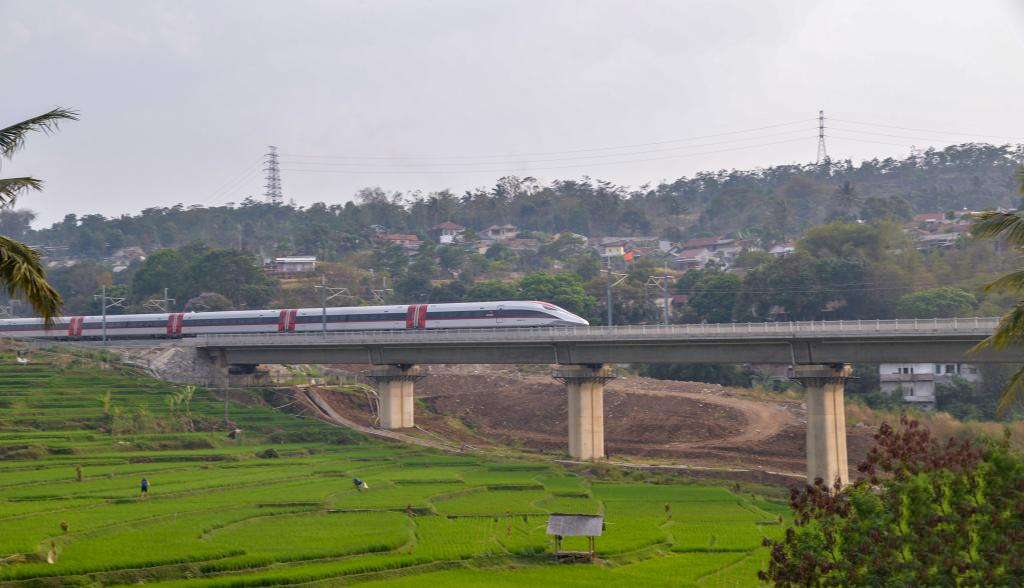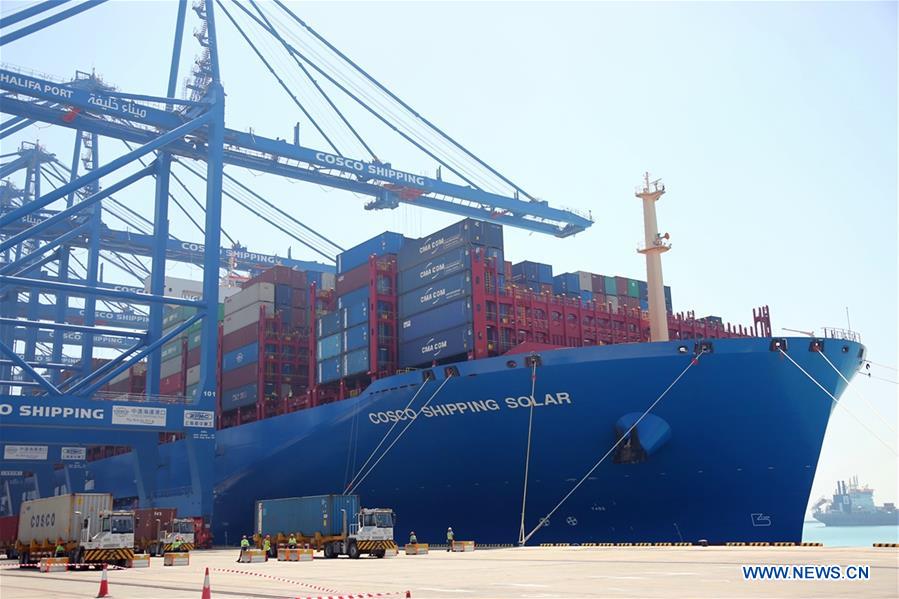
A high-speed electrical multiple unit (EMU) train running on the Jakarta-Bandung High-Speed Railway in Padalarang, Indonesia, October 16, 2023. /Xinhua
A high-speed electrical multiple unit (EMU) train running on the Jakarta-Bandung High-Speed Railway in Padalarang, Indonesia, October 16, 2023. /Xinhua
Editor's note: Kevork Almassian, a special commentator on current affairs for CGTN, is a Syrian journalist and founder of Syriana Analysis. The article reflects the author's opinions and not necessarily the views of CGTN.
The Belt and Road Initiative (BRI) is unjustly demonized by the establishment media. But the Chinese win-win development project is unstoppable and it is here to stay.
At a time when our troubled world desperately needs cooperation to ease the geopolitical tensions fuelled by the U.S.-led coalition comprised of a handful of countries, there is an alternative approach where countries can cooperate for mutual benefit.
The alternative approach, which is led by China, offers a new perspective to post-World War Two international relations through several mechanisms of economic interdependence which often involves the establishment of dispute resolution methods, and economic growth and development which lead to a more prosperous and stable region, less prone to conflict.
Keeping the above mechanisms in mind, African and West Asian countries found an alternative model in the Belt and Road Initiative (BRI) that aims to connect Asia, Africa, and Europe through a network of land and maritime trade routes.
As remarked by Chinese President Xi Jinping at the opening ceremony of the third Belt and Road Forum for International Cooperation "the Silk Road spirit of peace and cooperation, openness and inclusiveness, mutual learning and mutual benefit is the most important source of strength for Belt and Road cooperation." From the developing countries' perspective, their engagement in the BRI improves the people's welfare and hence human progress.
In Africa, for example, the BRI contributed to the construction of more than 10,000 kilometers of roads, more than 6,000 km of railways, and several significant infrastructure projects, including ports, airports, power plants, schools, and hospitals. This offers a subtle escape from the patronizing development politics of Western governments.
Considering this, it is worth examining the BRI's impact in Western Asia (the Middle East) and South Asia. The Chinese efforts through the BRI place a special focus on West Asia and South Asia, where numerous projects are being undertaken to enhance connectivity. By connecting China's western provinces and regions to Pakistan's Gwadar Port, for instance, the China-Pakistan Economic Corridor offers a direct path to the Arabian Sea and West Asia.
The enhancement of geographical connectivity by improving road, rail, and air transportation systems with frequent and free exchanges of economic growth and people-to-people contact, normalizes cooperation by a win-win model resulting in a well-connected, integrated region of shared destiny, harmony, and development.
Besides enhancing trade routes, China is a major investor in the energy sector in the Persian Gulf countries. For example, Chinese companies have been constructing pipelines and energy facilities, facilitating the connectivity of energy resources, and securing efficient energy supplies for China.
Chinese businesses have also made significant investments in ports and energy infrastructure close to the Strait of Hormuz, the main oil transit chokepoint in the globe. As an illustration, China built several facilities at the Khalifa Port in the United Arab Emirates and an oil pipeline that runs to the Port of Fujairah.

Chinese container ship SOLAR is seen at CSP Abu Dhabi Terminal of Khalifa Port in Abu Dhabi, the United Arab Emirates, May 25, 2019. /Xinhua
Chinese container ship SOLAR is seen at CSP Abu Dhabi Terminal of Khalifa Port in Abu Dhabi, the United Arab Emirates, May 25, 2019. /Xinhua
In 2021, China imported a staggering $128 billion worth of crude oil from countries along the Persian Gulf and the Strait of Hormuz – three times more than the United States and European Union combined.
China's global rise through investment also attracts countries that were destroyed by the U.S. or its proxies. One example is war-torn Syria which is devasted after 12 years of regime-change war and crippling unilateral coercive measures, illegal under international law.
Per a statement issued after the leaders of China and Syria met in Hangzhou ahead of the opening of the 19th Asian Games, the two nations have formed a "strategic partnership" to strengthen their mutual support and collaboration on "core interest."
According to Hussein Askari, the vice chairman of the Belt and Road Institute in Sweden, the strategic partnership opens the door for follow-up expert meetings from Syria and China to finalize practical agreements for Chinese investments in the country that desperately needs reconstruction projects.
China is aware of the importance of digital connectivity to contemporary life and how it affects everything from communication and education to economic growth and innovation. Hence, Chinese businesses are involved in developing digital infrastructure in West Asia, including 5G networks and so-called smart cities. This technology-driven connectivity can enhance communication and trade, as well as facilitate technological innovation in the region.
In addition to physical and digital infrastructure investments, China is encouraging cultural and academic exchange programs with the West Asian nations. Initiatives like Confucius Institutes and scholarships for students from the Middle East to study in China are examples of this. Such interactions foster intercultural understanding and promote people-to-people connectivity.
The BRI's 10 years of existence have shown that the rise of China has not been accompanied by wars, natural calamities, or colonial conquests. Instead, it has promoted infrastructure connectivity, international commerce, and economic growth. This is more than can be said for the ascent to dominance of the Western nations.
(If you want to contribute and have specific expertise, please contact us at opinions@cgtn.com. Follow @thouse_opinions on Twitter to discover the latest commentaries in the CGTN Opinion Section.)